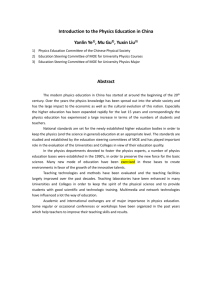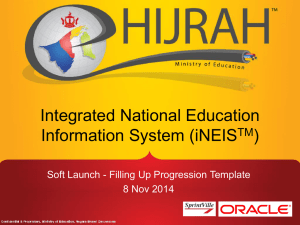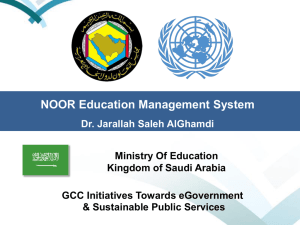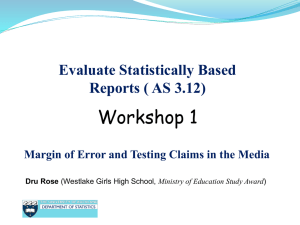Project D2-11
advertisement
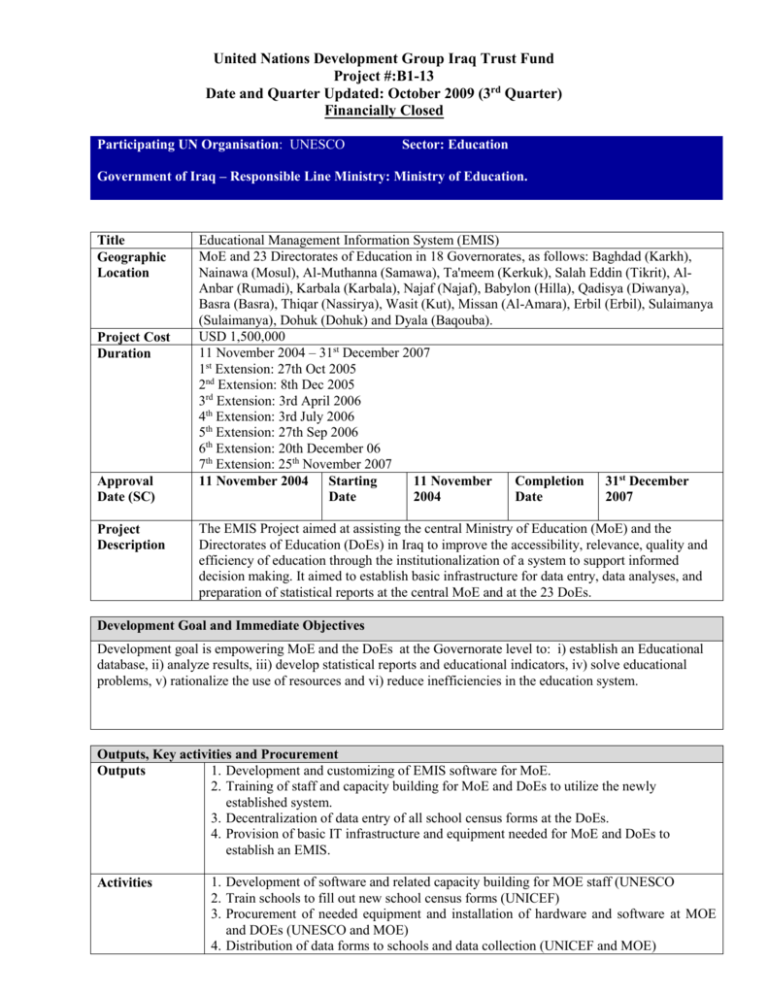
United Nations Development Group Iraq Trust Fund Project #:B1-13 Date and Quarter Updated: October 2009 (3rd Quarter) Financially Closed Participating UN Organisation: UNESCO Sector: Education Government of Iraq – Responsible Line Ministry: Ministry of Education. Title Geographic Location Project Cost Duration Approval Date (SC) Project Description Educational Management Information System (EMIS) MoE and 23 Directorates of Education in 18 Governorates, as follows: Baghdad (Karkh), Nainawa (Mosul), Al-Muthanna (Samawa), Ta'meem (Kerkuk), Salah Eddin (Tikrit), AlAnbar (Rumadi), Karbala (Karbala), Najaf (Najaf), Babylon (Hilla), Qadisya (Diwanya), Basra (Basra), Thiqar (Nassirya), Wasit (Kut), Missan (Al-Amara), Erbil (Erbil), Sulaimanya (Sulaimanya), Dohuk (Dohuk) and Dyala (Baqouba). USD 1,500,000 11 November 2004 – 31st December 2007 1st Extension: 27th Oct 2005 2nd Extension: 8th Dec 2005 3rd Extension: 3rd April 2006 4th Extension: 3rd July 2006 5th Extension: 27th Sep 2006 6th Extension: 20th December 06 7th Extension: 25th November 2007 11 November 2004 Starting 11 November Completion 31st December Date 2004 Date 2007 The EMIS Project aimed at assisting the central Ministry of Education (MoE) and the Directorates of Education (DoEs) in Iraq to improve the accessibility, relevance, quality and efficiency of education through the institutionalization of a system to support informed decision making. It aimed to establish basic infrastructure for data entry, data analyses, and preparation of statistical reports at the central MoE and at the 23 DoEs. Development Goal and Immediate Objectives Development goal is empowering MoE and the DoEs at the Governorate level to: i) establish an Educational database, ii) analyze results, iii) develop statistical reports and educational indicators, iv) solve educational problems, v) rationalize the use of resources and vi) reduce inefficiencies in the education system. Outputs, Key activities and Procurement 1. Development and customizing of EMIS software for MoE. Outputs 2. Training of staff and capacity building for MoE and DoEs to utilize the newly established system. 3. Decentralization of data entry of all school census forms at the DoEs. 4. Provision of basic IT infrastructure and equipment needed for MoE and DoEs to establish an EMIS. Activities 1. Development of software and related capacity building for MOE staff (UNESCO 2. Train schools to fill out new school census forms (UNICEF) 3. Procurement of needed equipment and installation of hardware and software at MOE and DOEs (UNESCO and MOE) 4. Distribution of data forms to schools and data collection (UNICEF and MOE) 5. Data entry (UNESCO and MOE) 6. Data consolidation into a national database (MOE) Procurement (major items) - Funds Committed Funds Disbursed Forecast final date IT Equipment (25 servers, 510 PCs, 124 printers, 44 UPSs, 50 scanners, LAN Accessories) Office Equipment VSAT Satellite Terminal $1,451,857 $1,451,857 31st December 2007 Quantitative achievements against objectives and results Development and 1. UNESCO contracted a private company to customizing of EMIS develop the EMIS software. software for MoE. 2. A Workshop was conducted in Beirut for the Director-General of Planning and 5 officials from the respective Directorate to design and develop the school census forms. Training of staff and 1. Technical Training for 2 programmers and capacity building for system analysts was conducted in Beirut on MoE and DoEs to utilize various programming languages and tools. the newly established 2. Two Training workshops on LAN system. Administration were organized in Baghdad and Alexandria for 50 LAN administrators at the MoE and DoEs. 3. Training workshops were also organized for MoE and DoE staff on data entry and training of 5 key IT personnel on SQL Reporting. 4. Training of 33 statisticians on EFA statistics organized in Dead Sea/Jordan during 1 – 13 April 2006 in collaboration with UNICEF. Training of another 30 statisticians organized during August 2006. 5. Training of 30 MoE and DoE high level officials on the Planning and Management of the Education Sector held in Amman from 15 – 27 April 2006. Another group of 30 officials were trained during August 2006 in Aqaba – Jordan. 6. Training of a Core Team of 5 Officials from MoE on the management and maintenance of Microsoft SQL Server 2000, the database structure of the EMIS Software, and the use of queries and Reporting Services to extract reports and output out of the database. 7. Training workshop targeting 17 Statisticians from DoEs and the core team from MoE on the use of SPSS in the production of statistical reports and indicators from the EMIS database. 8. Training workshop in Baghdad on the use of the SPSS Software for 21 Statisticians % of approved % of approved Delay (months) 96.79% 96.79% 17 % of planned 100% % of planned 100% following the previous one in Amman, and undertaken by MoE staff who were trained in Amman. • Decentralization of data entry of all school census forms at the DoEs. Data entry at the DOEs level started in 2006. Data entry for the schools year 2004-2005 and 2007-2008 was completed and checked several times and the yearly statistical books for both of them are nearly ready for printing. Data entry for the year 2006-2007 was completed and is subject to further review. As for the data of the school year 2005-2006, the data entry is ongoing and is expected to be completed in April 2009. % of planned • Provision of basic IT infrastructure and equipment needed for MoE and DoEs to establish an EMIS. UNESCO provided and installed IT equipment and servers in addition to some generators (20PCs per DoE) to establish LANs in all 23 DoEs throughout Iraq. % of planned 100% (as the project was destined to enter the data of the year 20042005 only.) 100% Qualitative achievements against objectives and results The untimate development goal of this project, as stated above, aimed at empowering the central MoE and the DoEs at the Governorate level to achieve the six objectives as stated above. The project was very successful in achieving the first three objectives, namely the establishment of an educational database, the analyses of data, and the production of accurate and reliable statistical reports and educational indicators. These outcomes that resulted from extensive training activities laid a solid foundation for achieving the other three objectives and subsequently the goal of solving educational problems and rationalizing the use of resources in order to reduce inefficiencies in the education system. Thus the objectives of sound educational planning and rational policy formulation would be achieved. These objectives are being presently addressed in the extension of this project as a component of the newly developed joint project B1-33. Main implementation constraints & challenges (2-3 sentences) The project faced during its implementation several obstacles. One major obstacle was the prevailing security situation in several Governorates in Iraq. It was difficult to distribute EMIS computers and equipment and establish LANs at all locations throughout Iraq. Another major obstacle was the continued loss of trained staff who changed positions and jobs throughout the project life. The management of the project by the MoE suffered from the lack of coordination and cooperation between the Central MoE and DoEs on one side and between the two DGs for Educational Planning and Information and Communication Center (ICC) on the other hand. When the Project started in 2004, the staff of ICT formed a section within the DG for Educational Planning. In the year 2005, ICT staff were moved to the newly established ICC that was established at the level of a General Directorate. No clear definition of authority and responsibility was made between the two. An external evaluation of the project has been completed.
